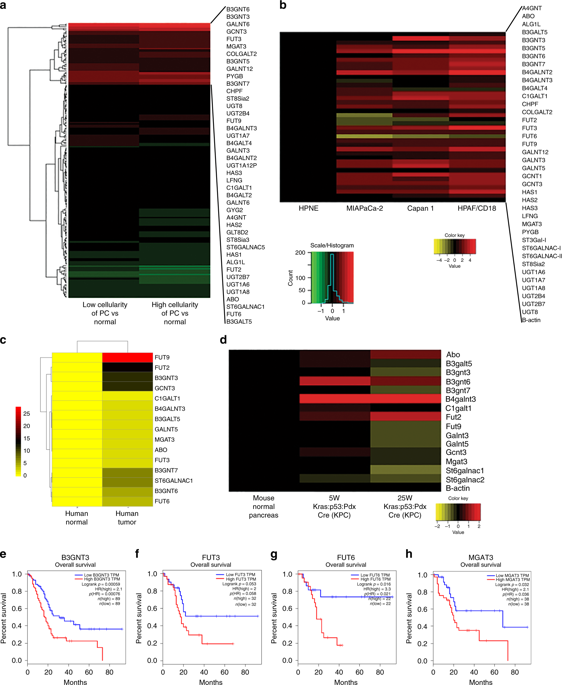当前位置:
X-MOL 学术
›
Br. J. Cancer
›
论文详情
Our official English website, www.x-mol.net, welcomes your
feedback! (Note: you will need to create a separate account there.)
Global analysis of human glycosyltransferases reveals novel targets for pancreatic cancer pathogenesis.
British Journal of Cancer ( IF 6.4 ) Pub Date : 2020-03-19 , DOI: 10.1038/s41416-020-0772-3 Rohitesh Gupta 1 , Frank Leon 1 , Christopher M Thompson 1 , Ramakrishna Nimmakayala 1 , Saswati Karmakar 1 , Palanisamy Nallasamy 1 , Seema Chugh 1 , Dipakkumar R Prajapati 2 , Satyanarayana Rachagani 1 , Sushil Kumar 1 , Moorthy P Ponnusamy 1, 3
British Journal of Cancer ( IF 6.4 ) Pub Date : 2020-03-19 , DOI: 10.1038/s41416-020-0772-3 Rohitesh Gupta 1 , Frank Leon 1 , Christopher M Thompson 1 , Ramakrishna Nimmakayala 1 , Saswati Karmakar 1 , Palanisamy Nallasamy 1 , Seema Chugh 1 , Dipakkumar R Prajapati 2 , Satyanarayana Rachagani 1 , Sushil Kumar 1 , Moorthy P Ponnusamy 1, 3
Affiliation

|
BACKGROUND
Several reports have shown the role of glycosylation in pancreatic cancer (PC), but a global systematic screening of specific glycosyltransferases (glycoTs) in its progression remains unknown.
METHODS
We demonstrate a rigorous top-down approach using TCGA-based RNA-Seq analysis, multi-step validation using RT-qPCR, immunoblots and immunohistochemistry. We identified six unique glycoTs (B3GNT3, B4GALNT3, FUT3, FUT6, GCNT3 and MGAT3) in PC pathogenesis and studied their function using CRISPR/Cas9-based KD systems.
RESULTS
Serial metastatic in vitro models using T3M4 and HPAF/CD18, generated in house, exhibited decreases in B3GNT3, FUT3 and GCNT3 expression on increasing metastatic potential. Immunohistochemistry identified clinical significance for GCNT3, B4GALNT3 and MGAT3 in PC. Furthermore, the effects of B3GNT3, FUT3, GCNT3 and MGAT3 were shown on proliferation, migration, EMT and stem cell markers in CD18 cell line. Talniflumate, GCNT3 inhibitor, reduced colony formation and migration in T3M4 and CD18 cells. Moreover, we found that loss of GCNT3 suppresses PC progression and metastasis by downregulating cell cycle genes and β-catenin/MUC4 axis. For GCNT3, proteomics revealed downregulation of MUC5AC, MUC1, MUC5B including many other proteins.
CONCLUSIONS
Collectively, we demonstrate a critical role of O- and N-linked glycoTs in PC progression and delineate the mechanism encompassing the role of GCNT3 in PC.
中文翻译:

对人类糖基转移酶的整体分析揭示了胰腺癌发病机制的新靶标。
背景 一些报告已经显示了糖基化在胰腺癌(PC)中的作用,但对特定糖基转移酶(糖基转移酶)在其进展中的全球系统筛选仍然未知。方法我们使用基于 TCGA 的 RNA 测序分析、使用 RT-qPCR 的多步骤验证、免疫印迹和免疫组织化学展示了严格的自上而下的方法。我们鉴定了 PC 发病机制中的六种独特的 angioT(B3GNT3、B4GALNT3、FUT3、FUT6、GCNT3 和 MGAT3),并使用基于 CRISPR/Cas9 的 KD 系统研究了它们的功能。结果 使用内部生成的 T3M4 和 HPAF/CD18 进行的连续体外转移模型显示,随着转移潜力的增加,B3GNT3、FUT3 和 GCNT3 表达减少。免疫组织化学鉴定了 GCNT3、B4GALNT3 和 MGAT3 在 PC 中的临床意义。此外,B3GNT3、FUT3、GCNT3 和 MGAT3 对 CD18 细胞系的增殖、迁移、EMT 和干细胞标志物也有影响。他尼氟酯是 GCNT3 抑制剂,可减少 T3M4 和 CD18 细胞的集落形成和迁移。此外,我们发现 GCNT3 的缺失通过下调细胞周期基因和 β-catenin/MUC4 轴来抑制 PC 进展和转移。对于 GCNT3,蛋白质组学揭示了 MUC5AC、MUC1、MUC5B(包括许多其他蛋白质)的下调。结论 总的来说,我们证明了 O-和 N-连接 gluT 在 PC 进展中的关键作用,并描述了 GCNT3 在 PC 中的作用机制。
更新日期:2020-04-24
中文翻译:

对人类糖基转移酶的整体分析揭示了胰腺癌发病机制的新靶标。
背景 一些报告已经显示了糖基化在胰腺癌(PC)中的作用,但对特定糖基转移酶(糖基转移酶)在其进展中的全球系统筛选仍然未知。方法我们使用基于 TCGA 的 RNA 测序分析、使用 RT-qPCR 的多步骤验证、免疫印迹和免疫组织化学展示了严格的自上而下的方法。我们鉴定了 PC 发病机制中的六种独特的 angioT(B3GNT3、B4GALNT3、FUT3、FUT6、GCNT3 和 MGAT3),并使用基于 CRISPR/Cas9 的 KD 系统研究了它们的功能。结果 使用内部生成的 T3M4 和 HPAF/CD18 进行的连续体外转移模型显示,随着转移潜力的增加,B3GNT3、FUT3 和 GCNT3 表达减少。免疫组织化学鉴定了 GCNT3、B4GALNT3 和 MGAT3 在 PC 中的临床意义。此外,B3GNT3、FUT3、GCNT3 和 MGAT3 对 CD18 细胞系的增殖、迁移、EMT 和干细胞标志物也有影响。他尼氟酯是 GCNT3 抑制剂,可减少 T3M4 和 CD18 细胞的集落形成和迁移。此外,我们发现 GCNT3 的缺失通过下调细胞周期基因和 β-catenin/MUC4 轴来抑制 PC 进展和转移。对于 GCNT3,蛋白质组学揭示了 MUC5AC、MUC1、MUC5B(包括许多其他蛋白质)的下调。结论 总的来说,我们证明了 O-和 N-连接 gluT 在 PC 进展中的关键作用,并描述了 GCNT3 在 PC 中的作用机制。











































 京公网安备 11010802027423号
京公网安备 11010802027423号